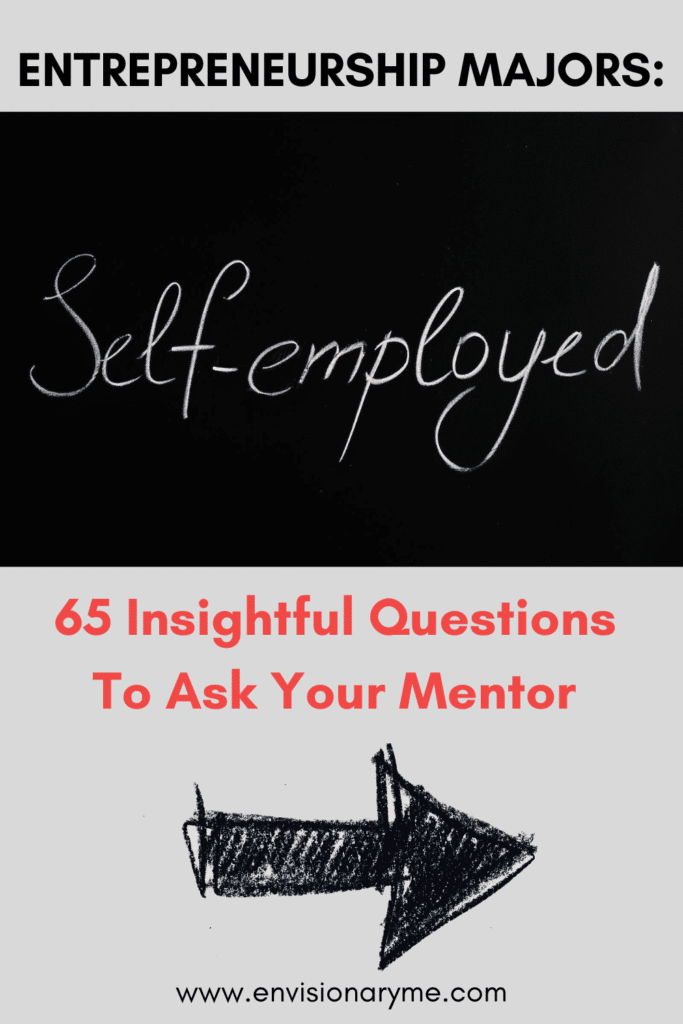Ask your mentor questions! Your mentoring relationship will improve when you ask for advice, thoughts on how to prepare or demonstrate leadership skills, or how to network and establish yourself. Successful mentoring relationships begin with preparation. Consider questions to ask your mentor about your career, your next meeting, and how to succeed. Maximize the relationship with your mentor by making this list of insightful questions part of your conversation. As an entrepreneurship major, you must take the lead when meeting with your mentor to maximize time – and the relationship – we’ll help get you started.

Entrepreneurship majors must be especially open to non-traditional mentorships and challenge themselves to take the lead when collaborating with mentors who may be moving at the speed of light! Asking insightful questions becomes critically important, and helps you start your own successful workplace journey!
Ask questions! Specific questions. And – ask for feedback!
A mentorship where the mentor is a business owner does not have to be set up in a traditional manner.
A mentor who is a good fit may not be able to meet you at a coffee shop, because they simply may not have time. Be flexible. Make suggestions! Navigate this process together.
For example, shadowing them or assisting may be of great help to you both.
You are their mentee, and receiving beneficial guidance, but you also have skills and expertise. Perhaps you have expertise in specific situations that are a blind spot for your mentor!
Perhaps volunteer to run a marketing campaign for them or to review their analytics; in return for the insights you provide, you absorb everything you can while you are onsite! Hold yourself accountable and deliver for them as you gain experience.
You aren’t looking to become their employee or act as their peer. You are fitting into their world and learning what it is literally like to be in that world. It’s helping them to help you. Just a suggestion.
Let’s explore questions to ask a mentor.

Meeting with your mentor
As you embark upon your own business, you consider and define what you offer.
It’s the same when meeting with a prospective mentor! Be prepared. Think through what you need from this mentorship. These thoughts become the basis for your mentorship plan.
Don’t assume you know it all. You don’t. Everyone thinks that.
Have confidence but check your ego and have a willingness to learn.
Mentorships help entrepreneurs start off on the right foot with regard to productivity, money mechanics, and prepare you for growth. You’ll learn more about how to define your business, your target market, and how you’ll go to market. This preparation helps you stay empowered and motivated in the early stages, and as you take off and become overwhelmed.
You know the saying about the when the going gets tough.
The harsh reality is that when the going gets tough, most stop. But Not You. Don’t let this be you.
Successful mentoring will help!
Your mentorship will offer unexpected learnings. If you are new to the full-time working world, you may have no idea what a full day looks like. What a 40-hour week looks like. What a business owner’s 70–80-hour week looks like!
Learn how to create a full, productive day when you feel like you have nothing to do vs. creating a full, productive day when you need to prioritize and then as you determine you are overly busy and ready to hire assistance.
Here’s a great tip! Show off your communication skills and improve the value of your mentoring program!
Bring up habits of successful entrepreneurs in conversation, in “how to” questions, and commit to improving these skills as part of your mentorship goals.
1. Strong leadership skills
2. Strong sense of self-awareness
3. Getting out of your comfort zone
4. Setting goals
5. Taking responsibility
6. Embracing change
7. Having a growth mindset
Read more on the Habits of Successful Entrepreneurs here.
Maximize your mentoring sessions!
It’s your plan. It must meet your needs.
If you are part of a mentorship program through school, you may have rules and a process to follow – if so – great. If you are creating your own program, think through various options, and create a mentorship plan that meets your needs.
Read more on important considerations when selecting a mentor.

Most importantly – don’t overthink.
Questions to ask “a” mentor are exactly the same as questions to ask YOUR mentor! You determine what is most helpful to your mentorship. Your mentor will also offer what they think is helpful for you.
If you are nervous, plan to break the ice by asking a few questions. Open-ended questions. Yes/no questions. There are no rules. While finding a mentor, be honest and tell them you need help. You can start by talking about their current role or career transitions, or even better, use your creativity and go about gaining your confidence another way. Dive in however you are most comfortable!
One student I spoke with is highly analytical, his first question was sparked by his mentor’s LinkedIn profile,
and he bypassed asking about how his mentor got started; instead, he dove right into asking about measurable results!
The aim of a mentor and mentee relationship is to find answers, not know the answer in advance! It’s important to demonstrate your commitment early on. Then tailor a mentorship plan to your career path and needs, using answers to the questions you can ask.
Mix, match, or create your own. These are thought starters. Take what you need.
Category 0: If the mentor has only 1-5 minutes for you:
The goal here – with 5 minutes or less, you get what you can from them!!
- What did they do right when they started out?
- What would they have changed when starting out?
- What’s their best piece of advice to you?
Seems like your mentor should have time for you, right?! I agree! But if you really want advice from a specific person and they cannot commit to a traditional mentorship – or any form of mentorship – and you catch them in the elevator or in the lobby and they say, “I’ve got 2 minutes, what’s your question?” You gotta go for it!
Category 1: Understand their career motivation
Understand whether inclusion was important if they knew it was for them, and soak up tips for asking and getting what you need out of this mentorship. It’s all about communication!
How they started. What drove them to see it through?
· When did you realize being an entrepreneur was right and personally satisfying for you?
· What products or services do you offer? When you started, was it new technology? Perfectly timed to meet a sudden consumer need? An alternative to existing products?
· How did you decide to open your own business vs. work for someone else?
· What were your first steps were most meaningful when you opened your business?
· When you founded your business, what was your most important objective?
· What personal traits helped you get started? How did they help with a starting point?
· What additional leadership qualities, traits, or skills did you learn were needed? How did you develop them?
· How do you envision the future of your business?
· What is your mission?
· Do you have a vision statement?
· What does success look like to you?
· Do you consider yourself successful?
Category 2: How did they prepare and start out in the workplace?
The beginning. Expected. Unexpected. Tactics that worked.
· Did you start out working alone?
· Did you have a lot to do or so much that you needed to prioritize?
· How did your structure your day?
· How did you structure your week? Month?
· Did you use a loose or a detailed plan? What did it look like?
· How did you know what activities would help the business grow?
· Did you ask others for advice?
· Did you have a mentor? How did they help you?
Category 3: How their leadership skills and business developed
How it started. How it developed. How it’s growing.
· What have you learned about business in general and your own business operations?
· Is your business based in the same location where you started? Why or why not?
· How many people work for or with you now?
· What are your current priorities for the business?
· What are your current priorities for yourself as the owner?
· What methods do you use to promote your business?
· Do you use a marketing plan? What has worked well to drive product introductions and reach? What methods have developed a deeper understanding of your consumer? Did that knowledge lead to changing the sales and marketing plan? What is working now?
· How should I start a business plan that will get me to this point?
· What’s your suggestion for achieving business growth according to plan?

Category 4: How to develop and promote your business – Hurdles your mentor faced
It’s empowering, but it’s not easy being a one-person army.
Getting started:
- How did you prioritize when you started out?
- How did you pay yourself?
To get started, you’ll need an income; that means another job until you can pay yourself, or, you must have a funding source to pay for yourself and your materials.
Budgeting:
· Did you fund the business off your own sales?
· Did you pay yourself?
· Did you utilize loans?
· How did you develop credit?
· Investors? What did the investors require in return? Did you negotiate?
· How did you weigh and make that decision as to what was best for your business?
· What offers did you leave on the table? Looking back, was it a good decision?
Staffing:
· Do you work alone?
· How do you get support when needed without a large budget?
· When did you decide it was time to hire support?
· What type of support or expertise became your first priority?
· How did you know it would pay back?
· How did you include budget assistance?
Expertise:
· People can wear many hats but may not wear them all well!
· What support did you need?
· How did you prioritize it?
· Did you learn it yourself, or hire or barter for support?
The Planning Process:
· How do you plan for growth?
· How did your planning process change?
· Did your plan become more complicated?
Competition:
· What does your competitive landscape look like?
· What competitors were unexpected?
· What competitors are the most challenging?
· Did your marketing plan always include outreach, retention, and product support? What worked? What is your current strategy?

Category 5: Networking and planning ahead
- How did networking help, and how will it benefit you in the future?
· How are you anticipating economic and/or environmental changes?
· How do you preempt competitors?
· How are you anticipating the ever-changing consumer landscape?
· What are you doing to create consumer engagement?
· Is your mentor planning a new long-term marketing strategy?
· What else is part of your company action plan?
Category 6: Key learnings, Key observations, Personal Life
Ask for key learnings and observations on the following:
- Government / Legal / Legislative
· Environmental – include sourcing and logistics
· Consumers
· Competition
· Themselves – as a leader and as a person
· Other – specific to their business or about ensuring personal needs are met
· What is your best piece of advice for me?
As a mentee, do know: Asking good questions is important throughout a mentorship!
Asking insightful questions of your mentor and maximizing your time is critical to your successful mentorship program. You want to draw conclusions. You want to understand how the product or service they offered took off and became successful. You want to know what worked well and what didn’t. You want their best piece of advice.
You do not have time to learn everything on your own. Know you won’t do everything right. You’ll stumble – we all do – but being prepared and armed with great knowledge will help you embrace change and both welcome and manage opportunities. You’re on track. You got this!

0 Comments